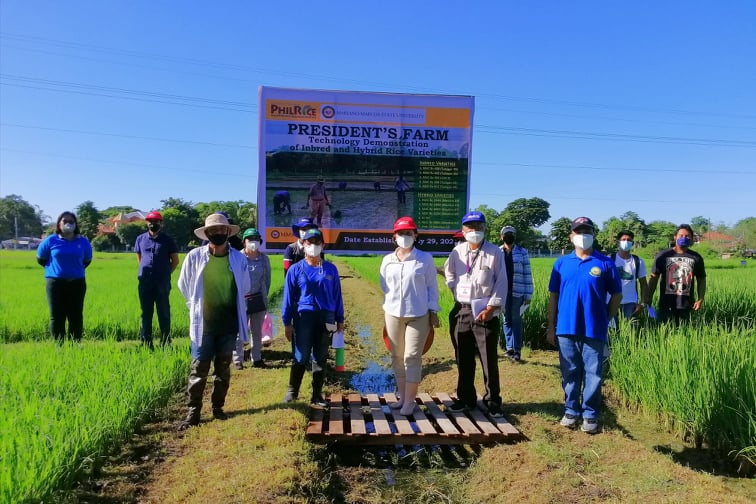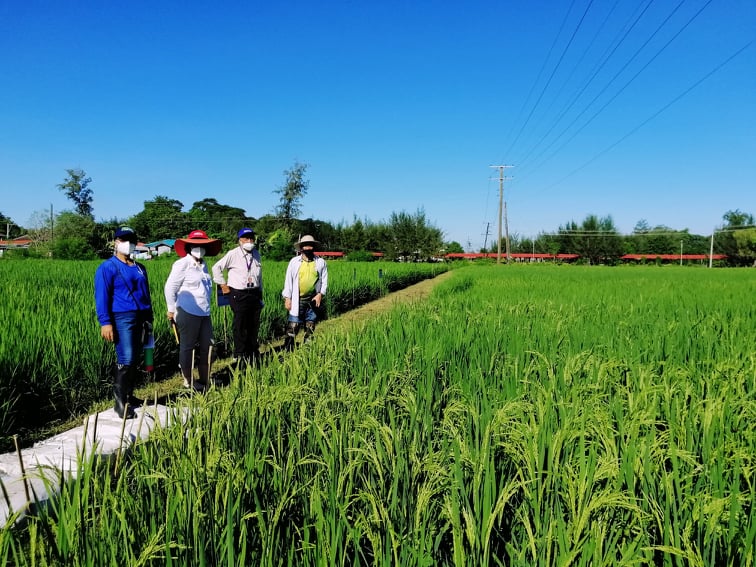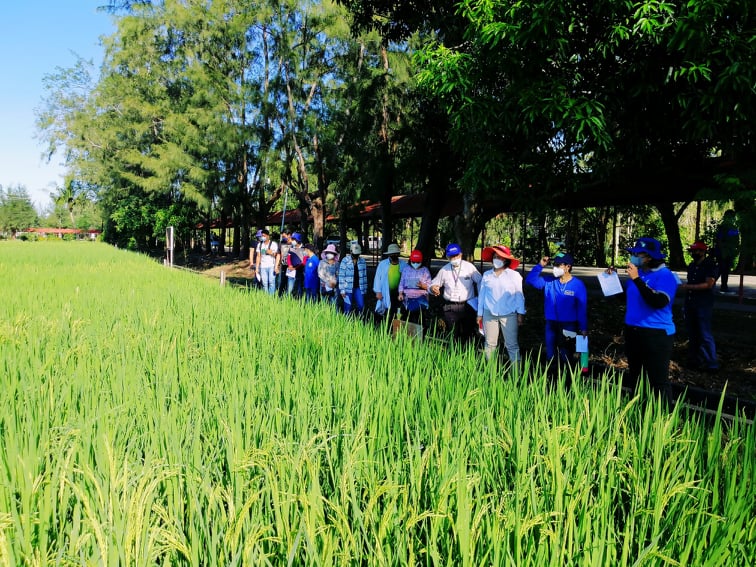.png)
President’s farm highlights agri-technologies
By Kimberly S. Miguel
As a National University for Agriculture, the Mariano Marcos State University continues to promote rice production and innovation – staying in the frontline to sustain food security in this part of the country.
The MMSU’s President’s Farm, located at the southwestern portion of the College of Agriculture, Food, and Sustainable Development (CAFSD) now showcases thirteen new and high-yielding inbred and hybrid rice varieties. These include eight public and private hybrid varieties almost 60 days after transplanting, and five inbred varieties at 30 days after transplanting.
Dr. Santiago Obien, technical consultant of the Department of Agriculture and a former MMSU president, led a group in a Field Walk at the one-hectare demonstration farm today, September 28. He discussed the rice varieties’ characteristics and potentials, together with Ms. Leylani Juliano, chief Senior Research Specialist and R&D Coordinator.
Joining them were PhilRice OIC Branch Director Hazel Jane Orge and the agency’s division chiefs, MMSU President Shirley C. Agrupis, Extension Director Aris Reynold Cajigal, and Dr. Dionisio Bucao of the University Research Directorate.
In the activity, Agrupis said that “being the only SUC in the region with a farm like this, we will optimize its potentials to promote agriculture to the younger generation, especially to inculcate the need for committed people who shall further advance and sustain the sector.”
Hybrid varieties planted in the President’s Farm are the 8-10 ton yielders and early maturing varieties (109-115 days after sowing). These include BR 650 (NSIC Rc 180H) produced by BioSeed, Habilis Plus (NSIC Rc 410H) produced by Bayer, Batari Indra 01 (NSIC Rc 406H), Mestiso 20 (NSIC Rc 204H) produced by PhilRice, the SL-19H (NSIC Rc 488H), SL-9H commonly known as Dona Maria, SL-613H by SL-Agritech, and PHB 73 by Corteva.
Mestiso 20 of PhilRice is hoped to reach farmer’s preference as it matures early at 111 days after sowing with an average yield of 6.4 tons per hectare and a potential yield of 11.7 tons per hectare. Fertilizer management applied for these varieties is at 203-42-102-85 kg NPKS per hectare in five applications.
Meanwhile, the inbred varieties planted last August 25-27 are the 400 and 500 lines of registered varieties. These include NSIC Rc 402 (Tubigan 36) developed by PhilRice, NSIC Rc 400 (Tubigan 35), NSIC Rc 480 (GSR 8), NSIC Rc 508 (Tubigan 42), and NSIC Rc 512 (Tubigan 44) developed by IRRI. These varieties mature early at 108-114 days after sowing, with the exemption of the NSIC Rc 480 (GSR 8) that matures at 120 DAS.
PhilRice-developed NSIC Rc 402 (Tubigan 36) is hoped to spur substantial increase in yield of rice farmers with its potential yield at 14.0 tons per hectare. Fertilizer rate applied is at 162-35-75-48 kg NPKS per hectare.
The President’s Farm was established last July 28, 2021 to showcase yield-increasing technologies, particularly on the use of high-yielding and early maturing rice varieties and to encourage rice farmers to adopt these technologies.
By next year, it is hoped that these rice varieties will also be showcased in the 25-hectare CARES Farm of the University. (StratCom)
Gallery
.png)



Dear Valued Client,
We will be introducing our newly upgraded website on October 31, 2024 – offering faster access, improved navigation, and enriched content for students, faculty, partners, and stakeholders. Experience how we cultivate minds and transform futures at MMSU.

 CAFSD
CAFSD CASAT
CASAT CAS
CAS CBEA
CBEA CCIS
CCIS COE
COE CHS
CHS CIT
CIT CTE
CTE COM
COM CVM
CVM Graduate School
Graduate School

 website_442b5c8cb6dbf01263375c24a73906cc.jpg)


